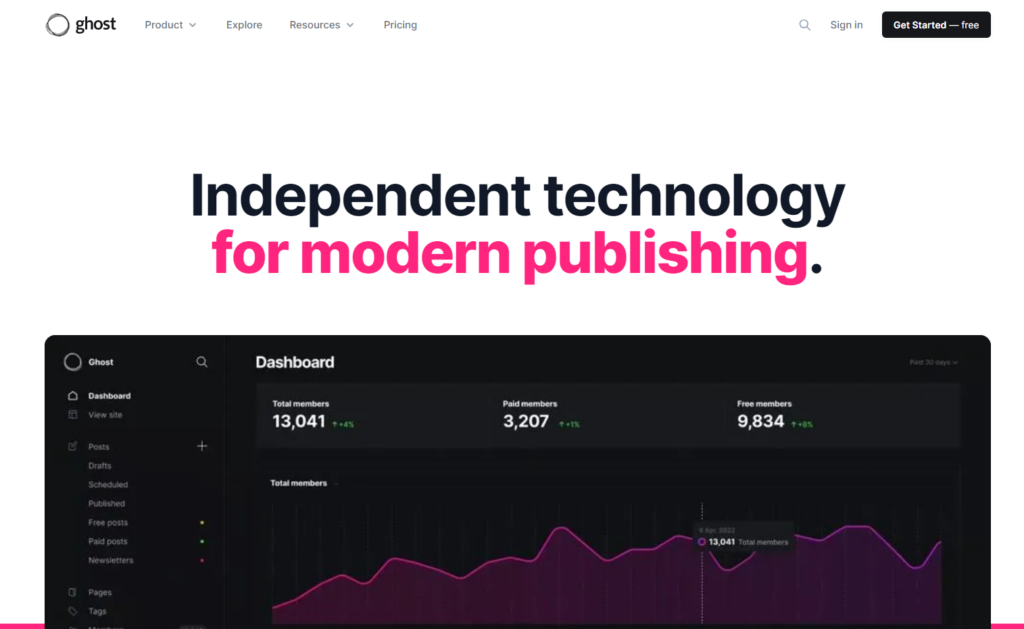Are you a budding writer, looking to share your thoughts and ideas with the world, but don’t know where to start? Starting a blog can be a daunting task, especially if you’re not tech-savvy. In this blog post, we will discuss the best blogging platforms for non-tech-savvy individuals in the UK.
We will cover 10 of the best free blogging sites and platforms, highlighting their features, ease of use, and why they might be the right choice for you.
By the end of this article, you should have all the information you need to choose the best blogging platform and start sharing your thoughts with the world.
So, without further ado, let’s begin!
What is a Blogging Platform?
A blogging platform is a website builder specifically designed for creating blogs.
It provides all the tools and features you need to publish your thoughts and ideas online. Blogging platforms typically offer an easy-to-use interface, a variety of templates and themes, and the ability to customize your blog to match your personal brand and style.
Some blogging platforms are simple and straightforward, allowing you to create a basic blog with minimal effort.
Others are more complex and offer advanced features and customization options for those who want to create a unique and feature-rich blog.
Why Choose a Blogging Platform Over a Regular Website Builder?
You might be wondering why you should choose a blogging platform over a regular website builder.
The answer is simple: blogging platforms are specifically designed for creating blogs, and as such, they offer a wide range of features and tools that are tailored to the needs of bloggers.
Here are some of the benefits of using a blogging platform:
- Easy to use: Blogging platforms are typically designed with ease of use in mind, allowing you to create and manage your blog without any technical knowledge.
- Customization options: While some blogging platforms offer simple and limited customization, others provide a wide range of templates, themes, and design options to make your blog unique.
- Built-in blogging tools: Blogging platforms come with a variety of built-in tools and features that are specific to blogging, such as comment management, social media integration, and SEO optimization.
- Community and support: Many blogging platforms have a strong community of users and developers who can provide support and guidance, as well as a wealth of online resources and tutorials to help you get the most out of the platform.
- Monetization options: If you’re looking to make money from your blog, some blogging platforms offer built-in monetization features, such as the ability to run ads or sell products and services.
The 10 Best Free Blogging Platforms for Non-Tech Savvy in the UK
Now that we’ve discussed the benefits of using a blogging platform, let’s take a look at some of the best free blogging sites and platforms available in the UK.
1. WordPress

WordPress is one of the most popular blogging platforms in the world, and for good reason. It offers a wide range of features and customization options, making it a great choice for both beginners and advanced users.
WordPress is an open-source platform, which means that it is free to use and modify. It also has a large community of users and developers who contribute themes, plugins, and support. While WordPress does have a slight learning curve, there are plenty of resources and tutorials available to help you get started.
One of the biggest advantages of using WordPress is the level of control and ownership you have over your blog. You can choose your own web host, domain name, and design, and you have the freedom to monetize your blog however you see fit.
2. Wix

Wix is a website builder that offers a free plan and a wide range of features, making it a great choice for non-tech-savvy individuals. With Wix, you can create a professional-looking blog with ease, using their drag-and-drop website builder and selection of designer-made templates.
Wix also offers a wide range of blogging tools, including comment management, social media integration, and SEO optimization. You can also add an online store to your blog and sell products or services directly to your readers.
3. Squarespace
Squarespace is a website building and hosting service that is known for its beautiful and professional-looking templates. It is an all-in-one platform, which means that it provides everything you need to get your blog up and running, including hosting, a domain name, and a suite of blogging tools.
Squarespace is particularly great for non-tech-savvy individuals as it offers an intuitive and user-friendly interface, making it easy to create and manage your blog. It also has excellent customer support, with 24/7 email and live chat assistance.
4. Weebly

Weebly is another popular website builder that offers a free plan and a range of features that are perfect for non-tech-savvy bloggers. With Weebly, you can create a blog using their drag-and-drop builder and selection of mobile-responsive themes and templates.
Weebly also offers a range of blogging-specific features, including comment management, social media sharing, and SEO optimization. You can also add an online store to your blog and sell products or services directly to your readers.
5. Medium
Medium is a unique blogging platform that is perfect for those who want to focus on writing and publishing content without the hassle of managing a website.
With Medium, you can create a free account and start publishing your thoughts and ideas immediately.
Medium has a clean and minimalist design that provides a distraction-free reading experience for your audience. It also has a built-in audience of engaged readers, which can help you reach a wider audience and build a following for your blog.
6. Blogger
Blogger is a free blogging platform offered by Google. It is easy to use and perfect for those who are just starting out with blogging. With Blogger, you can create a blog in just a few clicks and choose from a variety of templates to customize the look and feel of your site.
As a Google product, Blogger integrates seamlessly with other Google services, such as Google Analytics and AdSense. It also offers a range of basic blogging tools, including comment management, social media sharing, and SEO optimization.
7. Tumblr
Tumblr is a microblogging and social media platform that is perfect for those who want to share short-form content, such as quotes, images, and videos.
It is easy to use and has a built-in audience of engaged users, making it a great way to build a following and connect with other like-minded individuals.
Tumblr also offers a range of customization options, including the ability to use your own domain name, change the appearance of your blog, and even run ads to monetize your content.
8. Ghost

Ghost is a simple and lightweight blogging platform that is perfect for those who want a minimal and distraction-free writing experience. It offers a clean and intuitive interface, making it easy to create and publish content.
Ghost also has a range of powerful features, including a built-in subscription and membership system, email newsletter integration, and the ability to create and sell digital products directly from your blog.
9. Joomla
Joomla is a free and open-source content management system (CMS) that can be used to create a wide range of websites, including blogs.
It is highly flexible and customizable, offering a wide range of features and extensions to enhance the functionality of your blog.
While Joomla has a steeper learning curve than some of the other platforms on this list, it is a powerful and scalable option for those who want complete control over their blog. There are also plenty of resources and support available from the Joomla community.
10. Penzu

Penzu is a unique type of blogging platform that is designed for private and personal journaling.
It offers a secure and encrypted space for you to write down your thoughts and ideas, without the pressure of publishing them for the world to see.
Penzu has a simple and intuitive interface, making it easy to create and organize your journal entries.
You can also customize the look and feel of your journal, add photos and videos, and even set a password to keep your thoughts private.
How to Choose the Best Blogging Platform for You
Now that we’ve looked at some of the best free blogging platforms available, how do you choose the right one for you? Here are a few factors to consider when making your decision:
- Ease of use: If you’re not tech-savvy, you’ll want to choose a platform that is easy to use and doesn’t require any coding knowledge. Look for platforms with drag-and-drop builders and intuitive interfaces.
- Customization options: Consider how much you want to be able to customize the look and feel of your blog. Some platforms offer more flexibility than others in terms of themes, templates, and design options.
- Built-in features: Think about the blogging tools and features that are important to you, such as comment management, social media integration, and SEO optimization. Choose a platform that offers the features you need to create and manage your blog effectively.
- Monetization options: If you’re looking to make money from your blog, choose a platform that offers built-in monetization features, such as the ability to run ads or sell products and services.
- Community and support: Consider the level of community support and resources available for the platform. A strong community can provide guidance and assistance, as well as a wealth of online tutorials and resources to help you get the most out of the platform.
Conclusion
Starting a blog doesn’t have to be a daunting task, even if you’re not tech-savvy.
There are a number of excellent blogging platforms available that are designed to be user-friendly and intuitive, while still offering a wide range of features and customization options.
The 10 best free blogging platforms we’ve discussed in this article are all great choices for non-tech-savvy individuals in the UK, each offering its own unique set of features and benefits.
The best platform for you will depend on your specific needs and requirements, so be sure to consider the factors we’ve outlined in the previous section.
Remember, the most important thing is to choose a platform that you feel comfortable with and that allows you to share your thoughts and ideas with the world.
So, what are you waiting for?
Get out there and start blogging!
Read also: